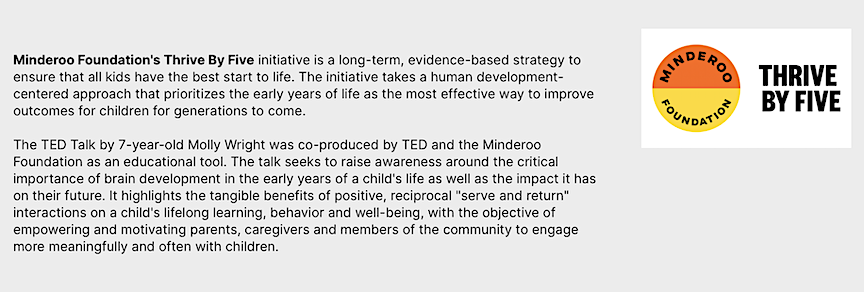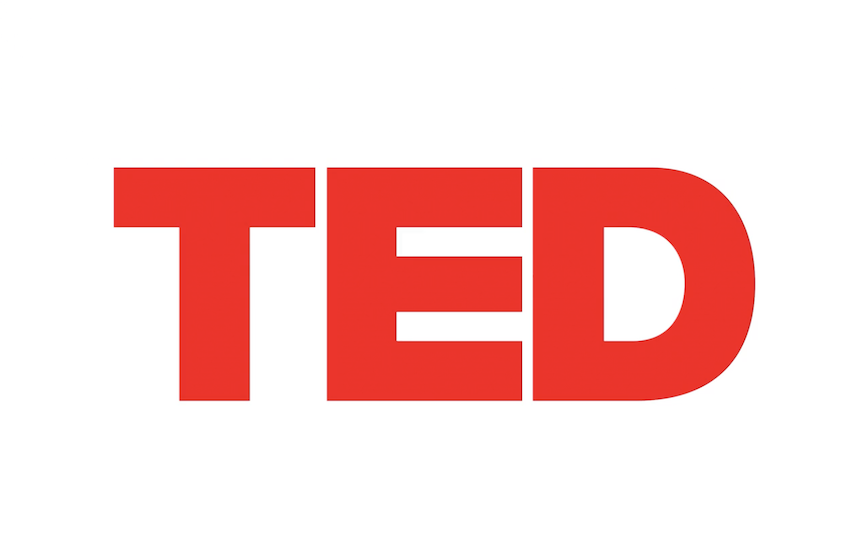TED TALK | MOLLY WRIGHT | TED AND MINDEROO FOUNDATION | JULY 2021
Molly Wright, a student from Queensland, Australia, is a passionate advocate for early childhood development. At just seven years old, she’s one of the youngest people ever to give a TED Talk.

TRANSCRIPT:
[Baby cooing]
00:20
What if I was to tell you that a game of peekaboo could change the world? Sounds impossible, right? Well, I’m here today to prove it’s not.
00:36
Hi, I’m Molly and I’m seven. And this is my little friend, Ari. Say “Hi,” Ari. Hi. Oh, and this is my neighbor, Amarjot. He has to take Ari away now to get ready for our experiment. But don’t worry, they’ll be back.
00:56
My talk today is about some powerful things you grownups can do.that shape us as children and the adults we become. How do I know? Because my parents and people around me did them early and often. I know not all kids are as lucky. Some of my friends, some kids at my school and many around the world. And I would really like to help change that. Thanks to scientists, we now know just how important the first five years are for our health and development, especially our brains. Ari started learning long before he was even born, from inside his mommy’s tummy. When Ari was born, he was tiny and he cried all the time. He was always hungry and he pooped a lot.
01:47
[Laughter]
01:49
Now he laughs and giggles and makes funny noises. But those are just the changes we hear and see. That’s way more going on inside.
02:00
So, let’s talk more about our brains. The blue bag is a rough size and weight of a healthy baby’s brain at birth. The red one is a baby’s brain after the first year. It almost doubles in volume. And by my age, it’s almost 90 percent the volume of an adult brain. Our brains develop faster in our early years than at any other time in our lives. It can create up to one million neural connections every second. But we need your help. Our healthy development depends on these top five things, One, connecting; two, talking; three, playing; four, a healthy home, five; community. All of this helps our brains and us reach our full potential.
03:00
So what’s something you can do that can really make a difference?Scientists call it serve and return. That’s just a grown-up way of saying connect, talk and play with us. And here’s the really big news. Amarjot, Ari, you ready?
03:19
(Audio) Amajat: Ready?
03:21
Molly Wright: Copycat games build imagination and empathy.
03:25
(Amarjot and Ari laughing)
03:29
Naming games build vocabulary and attention.
03:33
Amarjot: Daddy. Ari. Daddy. Ari.
03:38
MW: And games like peekabo — yep, peekaboo — actually build memory and trust.
03:44
Amarjot: Peekaboo!
03:46
MW: Each time you talk to us, play with us, make us laugh, it not only builds and strengthens our relationships and mental health, it actually teaches us some of the most important life skills, from making friends to taking the test, to getting a job, to one day maybe even starting a family of our own. Interactions early and often matter. Take it from me, the seven-year-old up here talking about brain science.
04:17
(Laughter)
04:18
OK, now let’s see what happens when the connection is taken away. So now he’s trying to get his dad’s attention again. He’s reaching out like, “That was fun, why have you stopped?”
04:34
(Ari cries)
04:36
I know it’s important for adults to use their devices sometimes, but kids are hardwired to seek out meaningful connections, not receiving them causes confusion and stress. OK, Amarjot, please re-engage.
04:54
Amarjot: Ah, there’s Ari.
04:56
(Ari laughs)
05:01
MW: Now what if our whole childhood was like that last 30 seconds? How hard it would be for a child to feel calm. To feel safe.To learn to trust anyone. And the lifelong impact that would have.That makes me feel sad. Ari only reacted the way he did and recovered so quickly because the connection between him and his dad is usually so strong. The positive relationships with the grown-ups in our lives gives kids the confidence we need to try new things, to explore and be a kid.
05:49
So please, try to remember the most special period for our development is the first five years. Starting from inside mommy’s tummy. What’s something really impactful you can do? Serve and return. And when? Early and often. Please give it up for a Amarjot and Ari.
06:17
(Applause)
06:25
Every moment together is an opportunity to connect, talk and play.Imagine the difference we could make if everyone everywhere did this. To us, the children, it’s so much more than just a game. It’s our future.
06:54
Thank you.
06:55
(Applause)
06:56
See? Peekaboo really can change the world.
06:59
(Applause)
Molly Wright’s resource list
Center on the Developing Child at Harvard, 2011 | Watch
“Three Core Concepts in Early Development”
This is a three-part video series from the Center and the National Scientific Council on the Developing Child on how experiences build brain architecture, how serve and return interactions shape brain circuitry and how toxic stress derails healthy development.
The Brain Architects Podcast | Center on the Developing Child at Harvard, 2020 | Listen
“Serve and Return: Supporting the Foundation”
What is “serve and return”? What does it mean to have a “responsive relationship” with a child? How do responsive relationships support healthy brain development? And what can parents and caregivers do in their day-to-day lives to build these sorts of relationships? This episode of the Brain Architects podcast addresses all these questions and more.
UNICEF | Explore
“Early childhood development: For every child, early moments matter.”
A collection of resources on the earliest years of life. Watch “Interacting with babies,” “Why play is important” and “Babies are scientists.”
Laura Mucha | UNICEF, 2021 | Article
“The science of love in childhood: Conversations with leading experts in childhood love, adversity and mental health.”
The ground-breaking new series by UNICEF sets out to cover how adversity impacts us as children and the adults we become, what we can do to protect and improve young people’s mental health and why safe and loving relationships are so vital for children’s health, development and well-being throughout life.
Carlota Nelson | Brain Matters, 2020 | Watch
“Brain Matters documentary | Early Childhood Development”
Brain Matters reveals that learning begins way before children go to school and that the experiences children are exposed to determine their chances for future success. Everyday situations such as play, relationships, language and nutrition are examined with a fresh scientific approach, aiming at a set of brain-boosting skills and activities that can provide every child with the opportunity to thrive.
Vroom | The Bezos Family Foundation, 2015 | Explore
“Vroom”
We believe all parents have the potential to create a bright future for their children. Our free, science-based tips and tools help parents and caregivers give children a great start in life today and an even better future.
Daniel J. Siegel and Tina Payne Bryson | Bantam, 2011 | Book
The Whole-Brain Child: 12 Revolutionary Strategies to Nurture Your Child’s Developing Mind
Twelve revolutionary strategies to nurture your child’s developing mind, survive everyday parenting struggles and help your family thrive.
Last Updated on September 27, 2023 by Real KBrett

